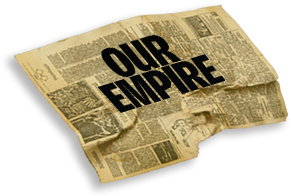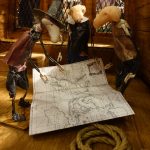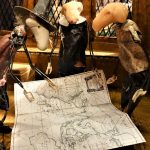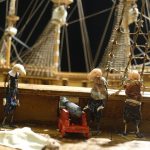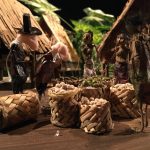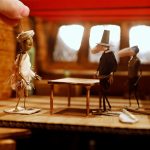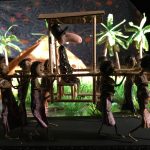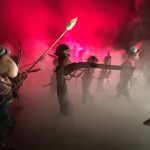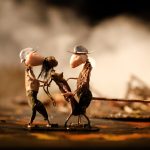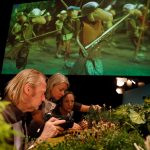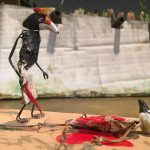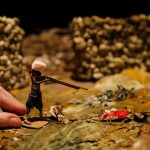


- Plays this season
- Premiere Year 2019
Hotel Modern & Arthur Sauer turn their gaze to the rise of 'our' East Indies. Our Empire provides stories about the early history of the Netherlands and Indonesia.
A vast scale model of the Indonesian archipelago fills the stage. We see paddy fields, rainforests, mosques, villages and cities. This island kingdom in miniature is populated by hundreds of 8cm-tall puppets.
The stories take place in the 17th century. We see Javanese princesses performing ancient court dances, and markets selling cloves, nutmeg and pepper. We watch enterprising Dutch merchants arrive at the islands in their mighty sailing ships, in search of costly spices. To safeguard their trade, they bring along powerful mercenary armies that seize control of more and more of the islands. We see cannons blasting, ships sinking, villages going up in flames, and princes selling spices and their own souls to the Dutch.
Hotel Modern uses ingenious puppetry to show how the process of colonisation took place.
The decision to create Our Empire was inspired by the family history of core company member Herman Helle, whose parents were born in the Dutch East Indies. In the course of our research we consulted with Indonesian artists, historians and Dutch people with an Indonesian background.
"The bloody battlefield may seem to take place on a miniscule scale - its impact is as poignant, astonishing as it is far-reaching." (Scenes)
"The love and attention that has gone into the creation of the puppets and the scale models is truly awe-inspiring." (Movement Exposed)
"Our Empire never turnes unbearably dark. Because of the dedication and humor, it's full of compassion." (Volkskrant)
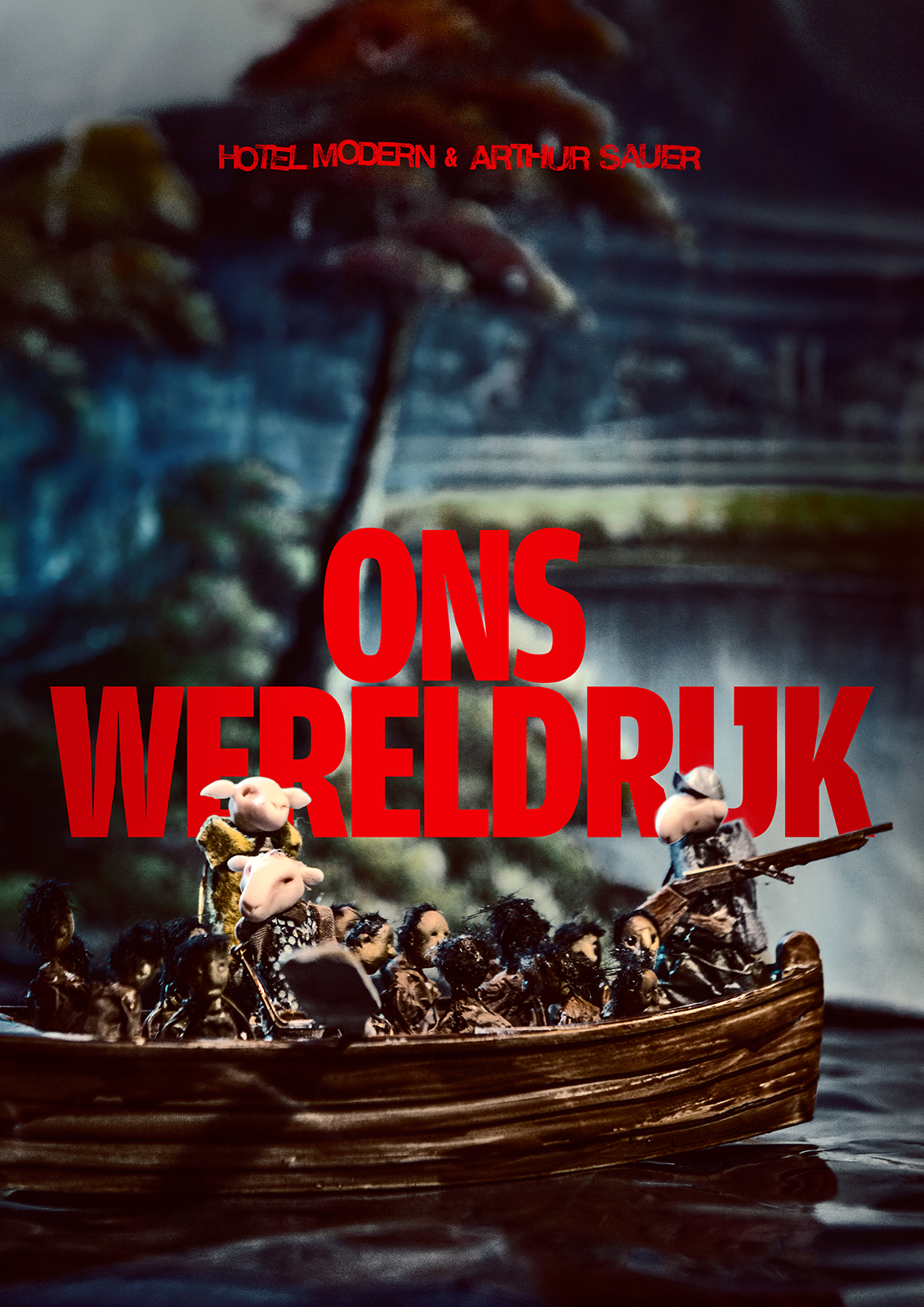
-
Reviews & articles
-
Hotel Modern portrays the colonisation of Indonesia in miniature (and in detail)
It is with 'Our World Empire' that Hotel Modern now returns to the FIMP festival, this Saturday and Sunday at the Teatro Municipal Campo Alegre. It shows how the market for spices (particularly nutmeg, cloves, and pepper) allowed the Dutch to build a powerful and opulent commercial empire – one that, of course, like any colonial history, came at the expense of the blood and sweat of indigenous peoples.
by Mariana Duarte/ Público Read More
Mariana Duarte 7 october 2023
The Dutch theatre company returns to FIMP with Our Empire, exposing one of the least known episodes of European colonialism. This Saturday and Sunday at Campo Alegre Theatre.
Hotel Modern likes to stage material that makes a powerful impact – visually and thematically. In the impressive set filled with a profusion of scale models, materials and puppets constructed in delicate and minute detail, they create scenes-within-scenes accompanied by live sound effects, and use cameras to project live video on a large screen. This exercise in the spectacular in miniature will quicken the heartbeat of anyone fascinated by detail and the unlimited convolutions of the imagination. In thematic terms, they tackle historical events that are as remarkable as they are distressing.
The Dutch trio’s first international hit was 2001’s The Great War, in which they recreated the trenches of the First World War. Their 2005 production Kamp, which evoked daily life in the Nazi concentration camp Auschwitz-Birkenau, was rooted in the family experiences of one of the company members. They performed this play at FIMP (Porto International Puppet Festival) in 2020.
More recently, in Our Empire they portray the first chapters of the Dutch colonisation of the Indonesian archipelago, which played out from 1600 to 1680. This piece, which again was instigated by the family history of one of the members, highlights one of the periods of European colonialism most often swept under the carpet.
It is with Our Empire that Hotel Modern is now returning to FIMP, this Saturday and Sunday at Campo Alegre Municipal Theatre. It shows how the market for spices (specifically nutmeg, cloves and pepper) allowed the Dutch to build a powerful and opulent commercial empire – one that obviously, like any colonial history, came at the cost of the blood and sweat of indigenous peoples.
They suffered slave labour on nutmeg plantations; the killing of those who revolted, including the genocide of the Banda people; the rape of women, resulting in dozens of children abandoned in orphanages; the extermination of religions, languages and customs; the exploitation of natural resources; and the impoverishment of local populations. In Western Europe, meanwhile, Dutch painting was reaching its zenith thanks to money stolen from the other side of the world. (To understand the baggage of this history and its legacies in the present [because none of this remains innocently in the past, behind us] read Amitav Ghosh’s recent book The Nutmeg’s Curse: Parables for a Planet in Crisis.)
To evoke this world in Our Empire, Hotel Modern show us cannons firing, ships sinking and villages burning, as well as intrigues, vaulting ambitions and negotiations over the sale of spices and souls to the devil. ‘As far as possible, we wanted to tell the story from the perspective of the Indonesians, and portray the Dutch as “aliens” who took control of their territories,’ explained Pauline Kalker, performer and co-maker at Hotel Modern, in an interview with Público.
Portugal and Japan in the mix
Performed and literally ‘manipulated’ by Pauline Kalker, Herman Helle and Arlene Hoornweg, the three central figures in the company, Our Empire is the result of an investigation in which the trio consulted and involved Indonesian artists, historians and friends, as well as Dutch people of Indonesian descent. They include artist Irwan Ahmett, based in Jakarta; sound designer Tomy Herseta, who ‘helped write the parts of the script in which the Indonesian people play the leading role’; and historian Ron Habiboe from the Maluku Islands (Moluccas), who worked with artists Henry and Joshua Timisela to support the company in preparing the accompanying programme about the Moluccan population in the Netherlands. ‘Another of our most important sources of information was The History of Hitu, written in the 17th century by Ridjali, a Moluccan imam,’ Arlene Hoornweg notes.
But it all started with the story of Herman Helle’s parents. They were born in what was then the Dutch East Indies. When, during the Second World War, these territories were invaded by Japan, which was trying to take over large parts of Asia, Helle’s father was conscripted into the army. He was 19 years old, and his mission was to fire at Japanese planes. It was a war in which the Netherlands were defeated, resulting in the loss of its 300-year-old colonial empire. Indonesia then temporarily fell under the yoke of Japanese rule, until they also quitted the territory with the advent of the 1945-1949 Indonesian National Revolution and subsequent independence. This second war claimed victims on various sides.
[pull quotes]
Bringing this national premiere to Portugal, to a country with its own colonial history and wounds, is ‘very significant’
In Our Empire we see cannons firing, ships sinking, villages burning and negotiations over the sale of spices and souls to the devil
Herman Helle’s father spent three years in a forced labour camp under Japanese rule. ‘He told me almost nothing about it, but he did let me look at his journals,’ the artist says. ‘Reading them, I found out about the forced labour and the hunger, and that on his birthday he saw a good friend executed before his own eyes. Soon after the Second World War, the war of independence broke out, and my father deserted – we portray this event in the play,’ Helle says. ‘He was never ashamed of having deserted. He had no appetite for yet another war.’
Hotel Modern initially wanted to create a piece focusing on the Indonesian War of Independence, ‘the biggest conflict never fought by the Netherlands’ [the Netherlands described its military operation as ‘police actions’]. Instead the trio chose to go further back, to the ‘origin of it all’. Given the impossibility of recreating all 17,000 islands of the Indonesian archipelago, they focus on three of the most painful points in the Dutch colonial endeavour: the islands of Java, Banda and Ambon. Banda and Ambon belong to the Malukus, and at the time Ambon was in the hands of (surprise!) the Portuguese. They were expelled by the armed merchants of the Dutch East India Company, the VOC, which was created to annihilate fellow European colonialists on the region’s trade route.
Educational aspect
Our Empire is divided into three parts. The first is the family story of Herman Helle, and he narrates himself. This is followed by the Dutch conquest of the Moluccan Islands, ‘told from the perspective of Orang Kaya of Hitu, an important leader in Ambon,’ says Pauline Kalker. The third is ‘an epic story about the way the Dutch used divide-and-rule tactics to seize power in Java.’ The piece ends with ‘the emergence of a new section of the population, made up of people of mixed heritage, which gave rise to a large community that is known today as Eurasian,’ the maker explains. ‘Many of these people now live in the Netherlands.’
Without detracting from the show’s artistic impetus and distinctive modus operandi (drawing on theatre, cinema, performance and visual art) the project clearly has an educational aspect, especially considering how little known and discussed this history is – in the Netherlands or elsewhere. In Portugal, the debate on colonialism in the region is still taking only its first steps, and proceeding with a succession of stumbles and silences.
‘Most people in the Netherlands don’t know much about the Banda genocide, except those of Moluccan origin. Schools pay very little attention to it,’ the company says. ‘We’re just beginning to face up to our colonial past. The current focus is mainly on the Atlantic trade in enslaved people, in which the Netherlands also played an important role. Our king recently made an apology for it, and for the violence used by Dutch colonial forces during the Indonesian war of independence, which was accepted. But he hasn’t yet apologised for the Banda genocide or for colonialism in Indonesia as a whole,’ they observe.
They do attest to some efforts to increase awareness in the arts, however: ‘There are many artists here who are addressing historical slavery, and various theatre practitioners are focusing more generally on the Dutch colonial era.’ In parallel to Our Empire, the company made a show for younger audiences titled Peter Pepper, with performances in schools, to make the history of the colonisation of Indonesia ‘accessible’ to children from the age of eight.
How to draw the audience in
The technical and narrative mechanisms the company uses – the audience watches both the ‘making of’ and the resulting video projection simultaneously, in real time – also foster a more inquisitive and light-hearted engagement with a weighty and complex subject.
‘Our use of scale models allows us to bring big themes to the stage, literally and figuratively. The audience watches us create miniature scenes that we project live on a big screen, and sees how realistic they are. The fact that they have to invest their own imagination draws them into the story and gets them involved,’ the artists say. ‘It’s a wonderful way to work for us, because it makes almost anything possible. We can have special effects like explosions, underwater scenes, and thousands of extras – because the puppets are just eight centimetres tall. We can use the cameras to look at the world through someone’s eyes, creating a powerful sense of intimacy.’
Hotel Modern uses a wide range of materials: ‘Clay, plastic, cardboard, souvenirs, photocopies… the list is long. We also make highly detailed puppets.’ They admit that it’s a huge logistical puzzle to get everything to run without a hitch, from making all the puppets move together to ‘timing the camera cuts and sound cues’.
The music and sound effects, essential to the dramaturgy and the rhythm of the piece, are orchestrated live by composer Arthur Sauer, a long-time collaborator with the company. ‘I think the best sound I managed to create is when a Portuguese ship sinks during a naval battle. It wasn’t possible to portray it visually. I used the sound of bamboo canes breaking – I constructed a lot of short cracks, stretching some of them, in several layers. It took me ten days,’ Sauer said in a Dutch interview.
For Hotel Modern, bringing this national premiere to Portugal, a country with its own colonial history and wounds, is ‘very significant’. ‘In this respect, the histories of our countries are quite similar,’ they say. ‘It’s good to look at this issue in a broader European context,’ given that ‘colonialism was a business in which many European countries were drawn together in a toxic political competition rooted in greed.’ Opening up the ‘darkest chapters’ of this history is a process to be continued.
-
Hotel Modern stages atrocities in miniature
The complexity of interaction between narrator-puppeteers Herman Helle, Pauline Kalker and Arlène Hoornweg is breath-taking as they blend performative domains: the documentary, the audio play, the war film, the history lesson.
by Kirsten van Santen/Leeuwarder Courant Read the whole review
Like children utterly absorbed for hours on end as they evoke worlds with a handful of puppets, toy cars, buildings and trees, in Our Empire, Hotel Modern’s third animated play, the cast create their own universe from tiny figures fashioned from cardboard, wire and clay. But this is no innocent children’s game, because in this play Hotel Modern bring to the stage the barbaric atrocities carried out by the Dutch in their 17th-century colony of Indonesia. The resulting scenes are as horrendous as they would have been at a larger scale.
At the start of the play Herman Helle, one of the three theatre practitioners who make up Hotel Modern, talks about his own roots in the Indonesian region: his ancestor the frigate captain Pieter Helle fathered the first of many generations who grew up in the Dutch East Indies. This knowledge immediately brings history up close, ensuring our transition into the colonised archipelago between 1600 and 1680 is a short one.
On the stage stand three large tables decked with scale models – built by the members of the company – of the Indonesian islands Java, Banda and Ambon. There we see the oceans, the Dutch East India Company vessels, the beaches, rainforests and villages, and the colonial capital and plantations. Hotel Modern use these models to tell of how the Dutch established their monopoly on the spice trade, and of the atrocities that went hand-in-hand with this process. The tiny figures representing the colonisers have had dog’s heads – creepy and milky white. The same narrative line is followed three times: the Dutch arrive, murder everyone in sight, pit communities and kingdoms against one another, sow discord, lie, cheat, and crush with the most terrible violence – and without the slightest qualm – any expression of freedom or autonomy. A tiny camera is used to film the highly detailed and perfectly choreographed miniature battles that are projected, larger-than-life, on a big screen.
Co-creator Arthur Sauer accompanies the events with an ingenious live soundtrack made using Indonesian gongs and drums, dusters, coconuts and – surprisingly – celery stalks, which turn out to be highly effective instruments for mimicking the sounds of snapping bones, a knife twisting in a human’s stomach, and a rat gnawing on reeds.
Expectations were high for this play, based as it is on the same techniques and approach Hotel Modern used for two earlier productions: The Great War and Kamp. And it rises to those expectations. The complexity of interaction between narrator-puppeteers Herman Helle, Pauline Kalker and Arlène Hoornweg is breath-taking as they blend performative domains: the documentary, the audio play, the war film, the history lesson. The ensemble has chosen not to incorporate a first-person protagonist, which serves to hold the audience at a distance. Is that a bad thing? I don’t think so. Our Empire is a cry of dismay, a stabbing index finger pointing at our colonial past, saying ‘Look at this! This is who we are!’
13-01-2020
-
Dutch greed in Indonesia (interview)
‘My parents were born in Indonesia,’ Herman Helle explains, ‘All four of my grandparents went there from the Netherlands. So although I grew up on the Dutch polder, our lives at home were suffused with a sense of the good old days in Indonesia. As far as I was concerned they had every right to their wonderful youth. But that happy narrative does clash with the historical reality. What do you do with a legacy like that?”
by René van Peer, BN De Stem Read More
In Our Empire, Hotel Modern theatre group show how the Dutch established their trading empire in the Indonesian Archipelago. This is a vivid and imaginative retelling of a history steeped in violence and duplicity.
In the chaos of a gun battle the shots ring out in deafening, deadly salvos. Clouds of smoke from the guns obscure our view of the action, but when they briefly lift we see that the firearms have clearly been effective. The bloodied victims lie to the left and to the right: men, and women and children, too. The men are armed with at most spears and clubs that are no match for their attackers. This scene comes not from action film, but from the latest play by Rotterdam theatre company Hotel Modern, titled Our Empire. It is the first part of a planned trilogy on the role of Dutch colonisers in Indonesia – the Dutch are the figures with the heads of sheep. Sea battles, ambushes, spice harvests, negotiations and duplicity, deceit and intrigue, the wealth of kingdoms, and Dutch greed: all have their part to play in Our Empire. Hotel Modern has been known since 2001 for its use of detailed scale models to tell its stories, filming them and projecting the resulting footage onto a large screen in plays that have followed the fortunes of a French soldier in the First World War, and life in a Nazi concentration camp.
This first part of Our Empire spans from the early 17th century to 1670, the period in which the Dutch East Indies Company (or VOC for short) built up its trade monopoly in the Indonesian Archipelago. It is a past with which artist Herman Helle, a member of Hotel Modern, feels a personal connection. ‘My parents were born in Indonesia,’ he explains, ‘All four of my grandparents went there from the Netherlands. So although I grew up on the Dutch polder, our lives at home were suffused with a sense of the good old days in Indonesia, the tempo doeloe. My parents wanted us to have a childhood as wonderful as their own: we walked barefoot; we ate Indonesian food; people coming from Indonesia were welcome visitors. For all I knew we were Indonesian. My parents were no invaders, and as far as I was concerned they had every right to their wonderful youth. But that happy narrative does clash with the historical reality, which has got a lot of dark aspects. And that’s what makes it very interesting, too. But what do you do with a legacy like that, for god’s sake?”
There’s often a personal component to Hotel Modern’s plays. Kamp, for example, is based on the experiences of members of Pauline Kalker’s family in concentration camps, and in God’s Beard Arlène Hoornweg dealt with her own mother’s death. Herman Helle had been wondering for a long time whether he should use his own family history for a play. ‘I know all about tempo doeloe, but that story’s been told a hundred times already,’ he says, ‘You could maybe do something about the war of independence, but it’s more interesting to look at what underlay it. To do that you need to go right back to the beginning. We decided to start at the point in the early 17th century when the Dutch captured the island of Ambon from the Portuguese. We end in the Dutch colonial capital Batavia [now Jakarta] in 1670, by which time the VOC has secured a monopoly on the spice trade. That’s the story we wanted to tell – from the perspective of Indonesians.’
To get an idea of what took place and the living conditions of the various population groups in this period, the group consulted historical sources and talked to historians. It didn’t make working any easier. ‘What drives you mad is there’s so much you don’t know. Engravings of villages on Ambon show very Dutch-influenced homes. Banda was once the only place where nutmeg was harvested, and Jan Pieterszoon Coen wiped out the entire culture there, and for a long time the global trade in the spice was based on these islands. So they must have been richly dressed. The scale model villages we built for the play are based on other Moluccan islands. And for a scene at the Javan court of Mataram, too, we wondered what it must have looked like, what kind of clothes people wore. You come up with all sorts of ideas, but you won’t find confirmation anywhere that that’s what it was like in reality.”
Hotel Modern spent a year building the scale models for Our Empire, and similar care went into Arthur Sauer’s composition of the music and sounds that accompany the scenes and add atmosphere. ‘No one’s got any idea about the music of the time or what a busy market sounded like,’ explains Sauer. ‘And you can’t just go to one and make recordings – there’s always a moped around, making a racket. The group chose to take a kind of documentary approach. I added in a layer of atmospheric sounds, with an emphasis on higher sounds when good things happen, and lower sounds to represent evil. Apart from that, I collected as many recordings as I could find of the insects and birds belonging to the islands where the play is set. The most successful sound, I think, is when a Portuguese ship sinks during a sea battle. It wasn’t possible to portray it visually. I used the sounds of snapping bamboo canes for that – lots of short cracks that I built up, stretching some of them, in loads of layers. It took me ten days to make.”
2 January 2020
-
Complex history in a superb performance with scale models
The events depicted here took place between 1600 and 1680, in a period when the Dutch were increasingly colonising the Moluccas in their rush for cloves and nutmeg. And when the local population did not give the Dutch what they wanted voluntarily, they took it by force.
by Elise van Dam, Parool Read More
A sea chest, photographs, a scale model of a house, and a pan of rice: these are the objects Herman Helle uses to sketch his paternal family history, one that is closely bound up with the colonial Dutch East Indies and the war of independence that followed. This short scene, which beautifully merges the personal and the historical, forms the prologue to Our Empire, Hotel Modern’s latest scale-model play. It is the first part of a planned trilogy on the Dutch presence in Indonesia. Atop the tables there are scale models of the Indonesian Archipelago, with its ocean, jungle, villages and palaces. They are inhabited by eight-centimetre tall puppets – the ones depicting Westerners have doglike heads. Helle, Arlène Hoornweg and Pauline Kalker ‘manipulate’ the scale models, filming as they do so and projecting the resulting scenes on a large screen. Meanwhile, composer Arthur Sauer provides the live soundtrack and effects: empty coconut halves for hoofbeats; snapping celery for bodies being violently broken.
The events depicted here took place between 1600 and 1680, in a period when the Dutch were increasingly colonising the Moluccas in their rush for cloves and nutmeg. And when the local population did not give the Dutch what they wanted voluntarily, they took it by force. Hotel Modern show how indigenous peoples were pitted against each another, setting in motion a cycle of revenge that the Dutch greedily encouraged: ‘For each head, a fine new sword.’ The cast add a narrative voice to the onscreen images, and it is a complex history to convey. While Hotel Modern’s earlier plays featuring scale models, such as The Great War and Kamp, also spanned an immense history, they incorporated individual stories and moments that brought history up close. In Our Empire, rather too much emphasis is placed on relating the history, and there are too few characters to relate to, and there are fewer memorable moments as a result.
The best scenes are those in which almost no words are spoken, when the focus rests firmly on the superb performances with the scale models, and on the juxtaposition between the three actors fiddling about with cameras and puppets and the resulting film on the screen. They include the dynamic, smoke-enveloped sea battles, and the sequence in which a Dutch delegation bring annual gifts to the gate the court in Mataram, where a toucan-headed ruler runs a rigid regime. It is in this latter part that we that we encounter the casually absurdist humour that typifies Hotel Modern. As always, Hotel Modern’s scale models are a wonder to behold and packed with ideas and detail. While Our Empire is perhaps a touch too educational, it lays a good basis for what could be a fascinating trilogy.
23 December 2019
-
Hotel Modern’s devotion and humour mean Our Empire is full of compassion, never unbearably dark
We watch as, with tireless concentration, the actors move around the stage. They use their cameras with precision timing so everything the audience sees on the large screen is bursting with life. In this case, it is life on the Indonesian Archipelago in the 17th-century, subjected to interference from external forces that is initially gradual, later increasingly active – first come the Portuguese and then the Dutch with their ‘enterprising mentality’ on colonial trade.
by Karin Veraart, Volkskrant Read More
Object-based production in which miniatures and cameras are used to portray life in 17th-century Indonesia.
Looming in the distance as you enter the theatre you can see the contours of the scale models on the stage. The tables are crammed with miniature sets that form tiny worlds populated by tiny, 8cm-tall figures that will later come to life and tell stories of great events. Welcome to Hotel Modern, the theatre company that has made its name with its unique form of object-based theatre, and their latest play Our Empire, which brings tales from the early history of contact between the Netherlands and Indonesia.
The members of Hotel Modern are artist Herman Helle and actors Arlène Hoornweg and Pauline Kalker. In past plays they have reimagined the battlegrounds of the First World War, and the horrors of a Nazi death camp. Rather than making work that is unbearably dark, however, their obvious devotion and humour injects deep compassion into these miniature figures, these tiny puppets so carefully and caringly brought to life in beautifully constructed biotypes. We watch as, with tireless concentration, the trio move around the stage. They use their cameras with precision timing so everything the audience sees on the large screen is bursting with life. In this case, it is life on the Indonesian Archipelago in the 17th-century, subjected to interference from external forces that is initially gradual, later increasingly active – first come the Portuguese and then the Dutch with their ‘enterprising mentality’ on colonial trade.
We see lively markets selling nutmeg and cloves, and elegant dances at the royal court; we see infighting, villages in flames, and political machinations on board a ship belonging to the Dutch East India company. This play marks a glorious start of what will become a trilogy.
23 december 2019
-
A Truly Awe-Inspiring Performance
The confidence with which the performers and technicians bring these worlds to live, the love and attention that has gone into the creation of the puppets and the models, is truly awe-inspiring. Our Empire is not only a one of a kind experience, it is also labour of love.
by Bregtje Schudel, Movement Exposed Read the whole review
Walking into the small venue inside Theater Rotterdam on Thursday, 19 December, for the premiere of Ons Wereldrijk (Our Empire) by Hotel Modern and Arthur Sauer, the first association is that of an elaborate miniature filmset. It is like walking into a cross between Madurodam and Universal Studios.
There are miniature villages and jungles, a model of a palace and a ship, and hundreds of small puppets no more than eight centimetres tall. The three performers and puppeteers (Herman Helle, Arlène Hoornweg, Pauline Kalker) are standing at the ready. Seated to the left is composer Arthur Sauer who will accompany the action with live sound effects (which will involve lots of celery). The scenes are captured on camera and projected on a large screen at the back.
For more than twenty years Hotel Modern has brought miniature worlds to life in the theatre. The worlds may be small; the themes Hotel Modern tackle are anything but. One of their biggest international hits was De Grote Oorlog (The Great War), first performed in 2001. Kamp (Camp) from 2005, which covers a day and a night in Nazi concentration camp Auschwitz-Birkenau, will return to theatres in 2020. In Ons Wereldrijk (Our Empire) the exposition is given in Dutch, but it is easy to imagine it being performed abroad in English or with English subtitles.
Ons Wereldrijk focuses on the fraught relationship between the Netherlands and Indonesia. Most readers will know how the colonization of Indonesia by the Dutch – who gave it the moniker Dutch East Indies – ended: with the Indonesian National Revolution in 1949. But how did the ‘relationship’ start?
Ons Wereldrijk covers the period between 1600 and 1680. The VOC Dutch East India Company, a trading company, was at the height of its power. The Dutch were the top traders of the era. And they had set their sights on exotic spices like cloves, nutmeg and mace. Back then, cloves were worth even more than their weight in gold.
These precious spices abound in the archipelago. Which made the Dutch more than willing to help the Indonesians fight those pesky Portuguese traders, or help Sultan Amangkurat II vanquish his biggest competition. The Dutch merchants had only one condition: sign your name on the dotted line, promising that in future you will trade exclusively with them. If the inhabitants were unfortunate enough to break the agreement – the Dutch really loved their contracts – the Dutch retaliated with bloody and ruthless force.
Ons Wereldrijk doesn’t shy away from uncomfortable truths. We watch as, sanctioned by the Dutch, women are raped, babies are speared, people are beheaded, blood pouring from their now exposed arteries. Yet, miraculously, the performance never gets too heavy-handed.
It is a delicate balancing act. By using puppets to re-enact the atrocities and adding dashes of humour here and there, the creators manage to create some distance, which is even further enhanced by giving the figurines fantastical features. While the figurines representing the original inhabitants of Indonesia look most like humans, the faces of the Dutch resemble those of sheep. The Sultan has the head of a great hornbill.
The confidence with which the performers and technicians bring these worlds to live, the love and attention that has gone into the creation of the puppets and the models, is truly awe-inspiring. Ons Wereldrijk is not only a one of a kind experience, it is also labour of love.
6-1-2020
-
Tourdates Our Empire
- View all our tourdates in the agenda
-
Makers
-
Concept, makers and performers Herman Helle, Arlène Hoornweg, Pauline Kalker Live soundtrack Arthur Sauer Soundtrack assistant Ruud van der Pluijm Voices in soundtrack Ida Ayu Maha Dewi, Tomy Herseta, Ruud Agerbeek, Jorn Heijdenrijk, Menno Vroon, Tomer Pawlicki, Maartje van den Brink, Laura Mentink Set building assistants Marsha Agerbeek, Heleen Wiemer, Kirsten Hutschemakers, Simon Schrikker, Juliet Campfens, Mark Hosking Costumes Roelie Westendorp, Caroline Hogendoorn Technicians Edwin van Steenbergen, Bas Standaar, Ruud Lamers, André Goos, Maarten van Dorp, Jorg Schellekens, Joost ten Hagen Poster and flyer design and photography Luis Xertu Subsidy Performing Arts Fund NL, City of Rotterdam Help during research: prof. dr. Henk Schulte Nordholt, Tristan Mostert MPhil and dr. Alicia Schrikker (University of Leiden), Marjolein van Pagee MA, Irwan Ahmett, Bart Westenbroek, dr. Tom van den Berge, Simon Kemper, drs. Mark Loderichs and others Special thanks to Ruud Agerbeek, Anne-Ruth Wertheim, Steve Elbers, Maureen de Jong, Dave Schwab and Albert Kokosky Deforchaux, who were willing to share their family history with us.




